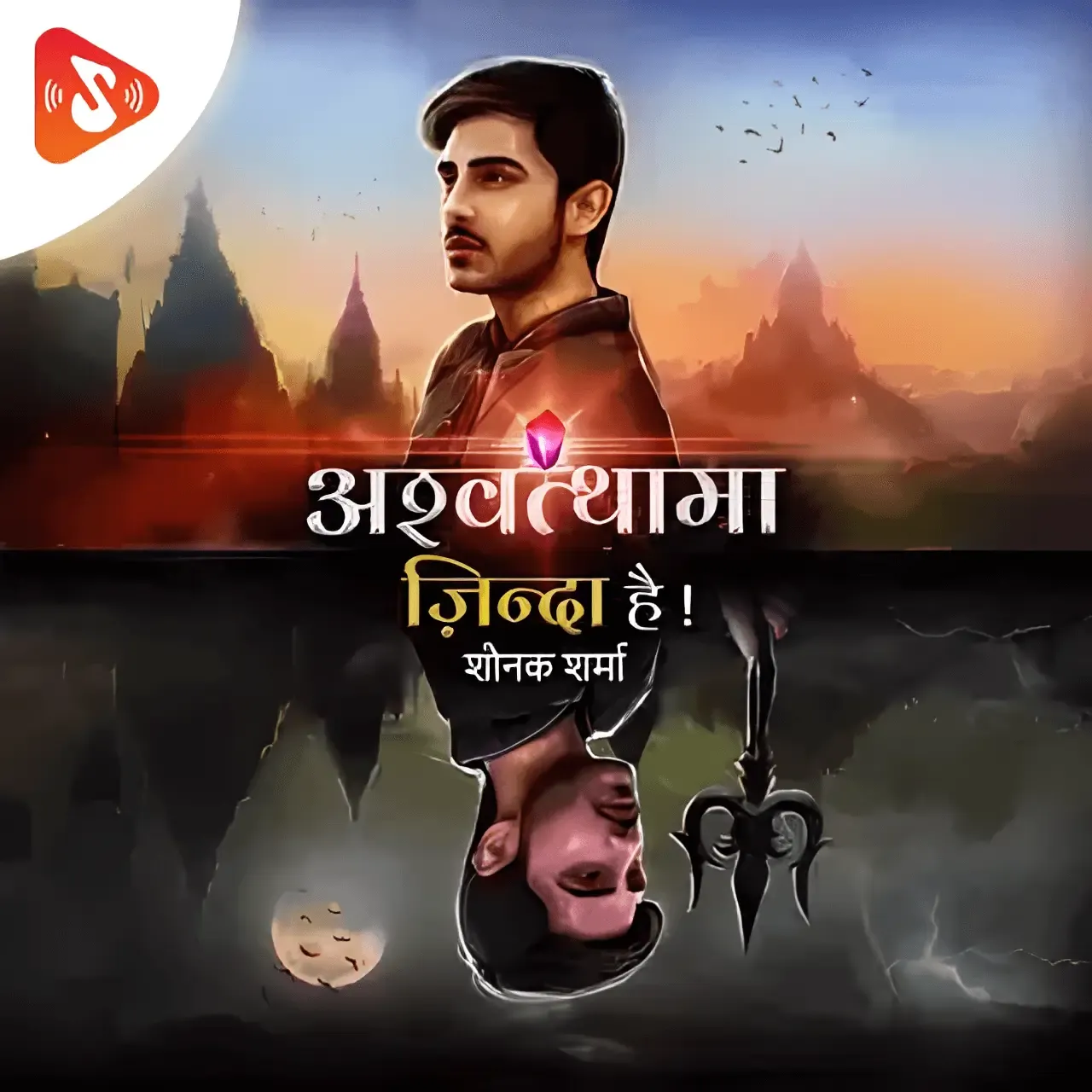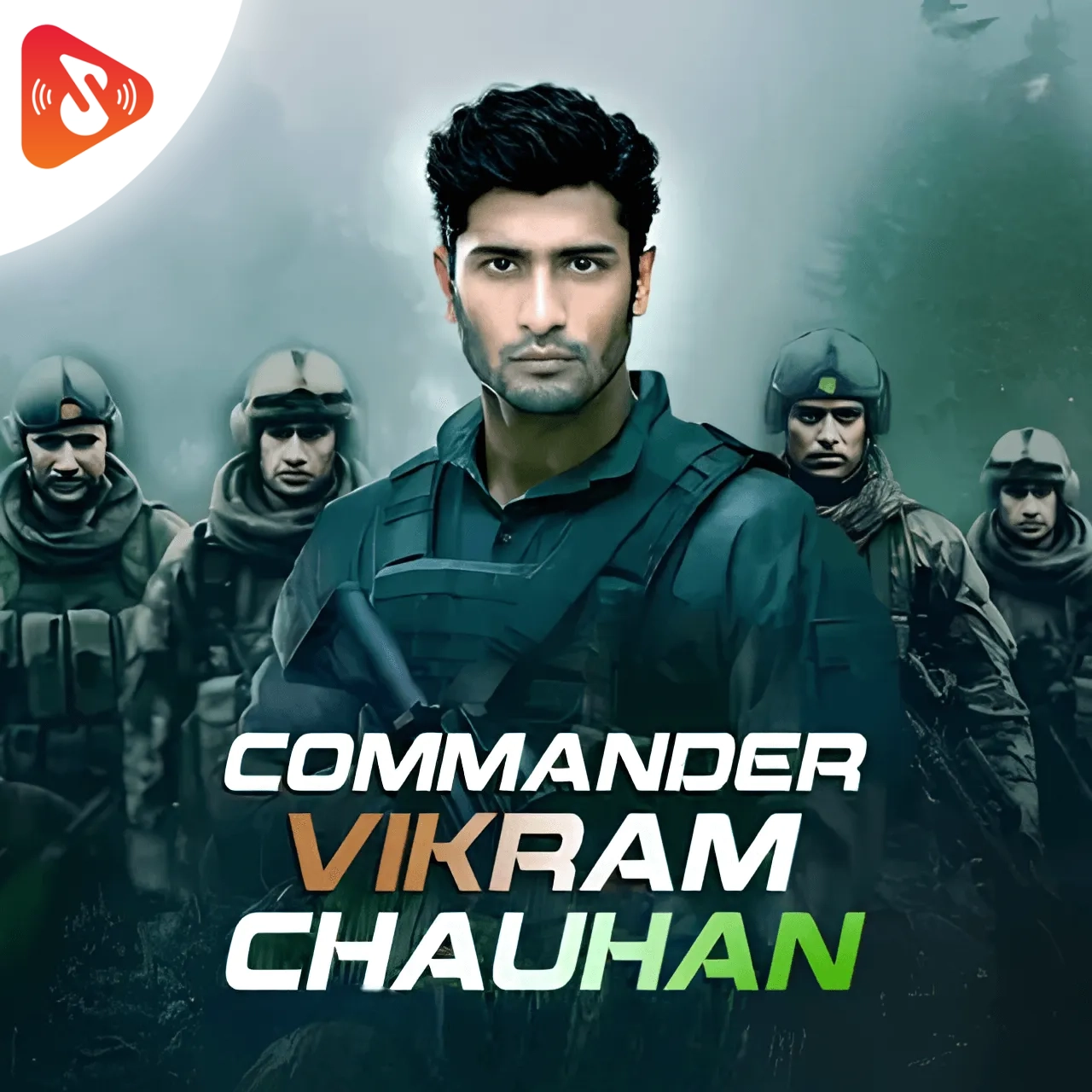-
1 : 3 मील उत्तर की ओर (16:17)
-
2 : चिरंजीवी अश्वथामा (18:56)
-
3 : गुमशुदा आलोक (20:40)
-
4 : भ्रम या सत्य (20:48)
-
5 : अश्वत्थामा का प्रकोप (22:16)
-
6 : आज का अर्जुन (14:24)
-
7 : दूसरा अर्जुन (14:58)
-
8 : ये कैसी माया है (14:54)
-
9 : देव दत्त लापता (13:57)
-
10 : संजोग या रहस्य (14:58)

- Episodes : 40 Audios
- Category : Suspense & Thriller
- Collection : Horror & Thriller
Ashwathama Zinda Hai: In the village of Vishalgarh, people believe Ashwathama is alive. They think he wanders the village, ready to deliver his unique justice. Moreover, the sunset signals danger. The legend says anyone outside after 5 p.m. will meet Ashwathama, the immortal enemy.
Prithvi and his loyal friend Arjun have escaped a deadly prophecy against all odds. This astonishes their fellow villagers. Their strong bond seems to protect them from the fate that has struck others who ventured out at night.
Yet, fate has more in store for Arjun than he could have ever imagined. One evening, as he stepped out into dusk, he found himself transported back in time. Now, he's in the midst of the ancient Mahabharata battlefield. The war's sights, sounds, and smells engulf him. Arjun realizes that someone has thrown him into the past.
Arjun faces the challenge of adapting to a new reality. He must learn from the past and team up with Mahabharata legends. The struggle is tough. It tests his bravery, strength, and sense of self.
In the chaos of battle, Prithvi's friendship is Arjun's anchor. It provides comfort and support. Together, they explore Vishalgarh's secrets and the mystery of Ashwatthama's survival.
The story weaves destiny, time, and connections. Arjun must face Ashwathama and uncover their shared secrets. This journey reveals truths that shake his understanding of reality. It leads him to a showdown that will decide his fate and that of others.
Ashwathama Zinda Hai
As the legends of Vishalgarh unfold, the aura of Ashwathama’s presence grows more profound. Every villager knows the tale, yet no one dares to speak of him openly. Ashwathama is more than a past figure; he is seen as a judge of good and bad. The haunting phrase, "Ashwathama Zinda Hai," echoes in whispers throughout the village. It reminds everyone of his eternal existence. He punishes those who stray from righteousness, and this belief has kept Vishalgarh’s people in line for generations. They follow an unspoken rule: stay indoors before sunset, or face the immortal being.
Prithvi and Arjun, yet, are different. Their friendship gives them the courage to question the narratives others blindly follow. They’ve grown up exploring the dense forests and hidden caves around the village, unearthing secrets that others wouldn’t dare to uncover. Yet, even their bravery falters as the rumors of Ashwathama’s wrath grow louder. The villagers tell of glowing eyes in the dark and heavy footsteps echoing through the empty streets. Ashwathama Zinda Hai, they say, their voices trembling. For Prithvi and Arjun, these tales are more than just folklore—they are the backdrop to their lives.
One day, driven by his insatiable curiosity, Arjun decides to challenge the village’s greatest fear. As the sun begins to set, he steps beyond the boundaries of safety, armed with nothing but his courage and a lingering doubt about the legends. What he encounters is beyond his comprehension—a sudden burst of light, a deafening roar, and the world around him shifts. When he regains his senses, he is no longer in Vishalgarh but in the midst of a battlefield that defies imagination.
The Mahabharata war is unlike anything Arjun has ever seen. The scale of destruction, the valor of the warriors, and the divine interventions at play leave him in awe and terror. As he moves through this ancient world, the chilling mantra, Ashwathama Zinda Hai, seems to follow him. It serves as both a warning and a call to action. He struggles to adapt, each moment feeling like a test of his endurance and willpower. As he meets the key figures of this epic tale, they view him as a puzzle, a stranger discussing the incomprehensible. Yet, his determination aligns with their cause.
Arjun’s journey through the Mahabharata is not just physical; it is deeply personal. He discovers strengths he never knew he possessed and confronts weaknesses he had long ignored. Each battle he faces, each decision he makes, pushes him closer to the truth about why he was brought here. The mystery of Ashwathama looms large over his journey, a shadow that grows darker with each passing day. Ashwathama Zinda Hai becomes more than a phrase; it’s a reality he must understand. Arjun realizes that his connection to the immortal warrior is more profound than he ever imagined. The answers lie in the past, in the very fabric of the Mahabharata itself.
Back in Vishalgarh, Prithvi refuses to give up on his friend. He delves deeper into the village’s history, uncovering ancient texts and forgotten records that speak of Ashwathama’s curse. The stories are fragmented and contradictory, but a pattern begins to emerge. The recurring theme of Ashwathama Zinda Hai appears in every account, reinforcing the villagers’ belief. Prithvi discovers that Ashwathama’s immortality is both a punishment and a burden. It reminds Ashwathama of the Mahabharata and his choices that led to eternal torment. Prithvi learns that Arjun's disappearance is part of a bigger plan. It aims to end a cycle of fear and redemption that has trapped Ashwathama for centuries.
As Arjun immerses himself in the chaos of war, he discovers unexpected allies and adversaries. Among them is Ashwathama himself—a figure shrouded in mystery and pain. Their interactions are tense and fraught with unspoken truths. Ashwathama sees in Arjun a reflection of his younger self, a warrior burdened by choices and the weight of destiny. Arjun, in turn, sees Ashwathama not as a monster but as a tragic figure, a man punished for his loyalty and love for his father, Dronacharya. Ashwathama Zinda Hai, he realizes, is not just a warning but a testament to the warrior’s unending pain. This knowledge complicates their relationship. It turns their fight into a clash of ideologies, not just strength.
As the Mahabharata reaches its climax, so does Arjun’s journey. He stands at the crossroads of time, faced with a decision that could change the course of history. Should he fight to end Ashwathama’s torment, or let the curse run its course? The choice is not easy, for it involves sacrificing a part of himself, a piece of his soul that he may never regain. Yet, Arjun finds strength in his lessons, his allies, and his bond with Prithvi. Ashwathama Zinda Hai becomes his guiding principle, a reminder of the stakes and the possibilities.
The final showdown between Arjun and Ashwathama is a spectacle of emotions and revelations. It is a battle that transcends time and space, a clash of wills that will determine not just their fates but the destiny of Vishalgarh and its people. As the dust settles, the truth about Ashwathama’s immortality and the role Arjun is destined to play is finally revealed. It is a moment of catharsis, a resolution that brings peace to some and a new beginning to others.
When Arjun returns to Vishalgarh, he is forever changed. The village, too, is different. The fear that once gripped its people has been replaced by hope and understanding. Ashwathama Zinda Hai is no longer a phrase of terror but a story of redemption and the enduring power of human connection. Arjun and Prithvi’s journey symbolizes courage and friendship. It shows that compassion and determination can lift even the darkest curse.
In the end, Vishalgarh is no longer haunted by the shadows of the past. The people have rewritten their destiny, inspired by the tale of Ashwathama. The legend of Ashwathama Zinda Hai lives on. It now symbolizes resilience and hope. It reminds everyone to confront their fears and rewrite their stories.
Years after the events that changed Vishalgarh, the village thrives in an era of unity and self-reliance. The forests that once seemed ominous now appear as guardians of life and wisdom. The legend of Ashwathama Zinda Hai continues to hold significance, but it is no longer steeped in dread. Instead, it is recounted with reverence for the warrior’s journey and his redemption. Schools teach the story to children, encouraging them to learn the value of courage and redemption.
Prithvi is the village chronicler. He records the tales of Ashwathama and the rise of Vishalgarh. His writings explore the depth of the phrase Ashwathama Zinda Hai, unraveling its impact on generations of villagers. Through these efforts, the legacy of Ashwathama becomes a symbol of resilience and hope. Arjun, meanwhile, mentors the youth. He shares lessons from his journey.
Ashwathama himself, though unseen, remains a part of the world. His presence is in the winds that sweep through Vishalgarh, in the rustling leaves, and in the quiet nights where the stars shine brighter. Ashwathama Zinda Hai serves as a gentle reminder of the complexities of life and the strength required to face them.
The villagers, once paralyzed by fear, now live by a new mantra: Face your fears, for even immortals seek redemption. The transformation of Vishalgarh is complete, a testament to the power of stories to shape lives and inspire change. Ashwathama Zinda Hai will echo in the hearts of those who choose to rise above their fears and embrace life's endless possibilities.
